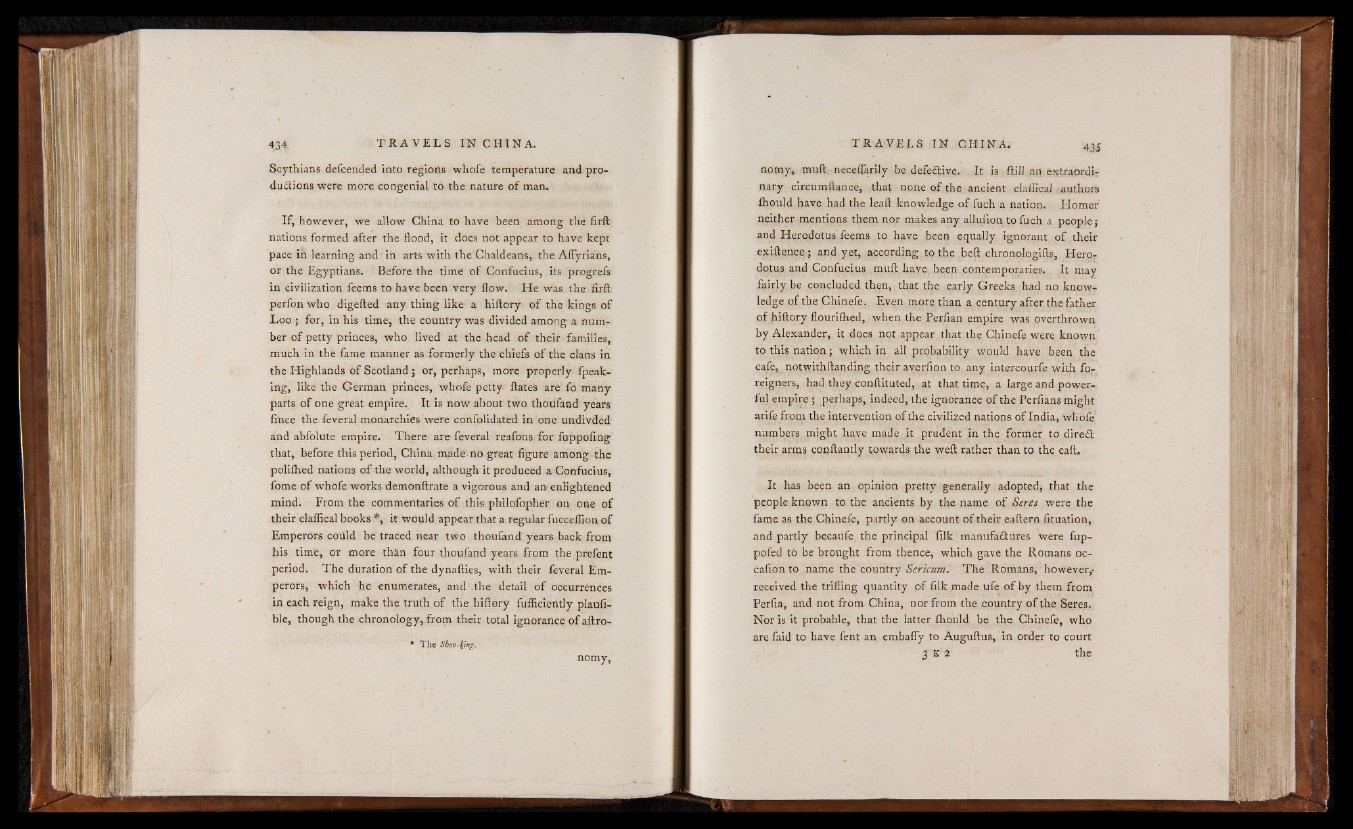
Scythians defcended into regions whofe temperature and pro-
du&ions were more congenial to the nature o f man.
If, however, we allow China to have been among the firft
nations formed after the flood, it does not appear to have kept
pace in learning and in arts with the Chaldeans,, the Aflyrians,
or the Egyptians. Before the time o f Confucius, its progrefs
in civilization feems to have been very flow. He was the firft
perfon who digefted any thing like a hiftory o f the kings o f
Loo ; for, in his time, the country was divided among a number
o f petty princes, who lived at the head o f their families,
much in the fame manner as formerly the chiefs o f the clans in
the Highlands o f Scotland ; or, perhaps, more properly fpeak-
ing, like the German princes, whofe petty ftates are fo many
parts o f one great empire. It is now about two thoufand years
fi'nce the feveral monarchies were confolidated in one undivded
and abfolute empire. There are feveral reaftms for fuppofing
that, before this period, China made no great figure among the
poliihed nations o f the world, although it produced a Confucius,
fome o f whofe works demonftrate a vigorous and an enlightened
mind. From the commentaries o f this philofopher on one o f
their claffical books * , it would appear that a regular fuccefiion o f
Emperors cotild be traced near two thoufand years back from
his time, or more than four thoufand years from the prefent
period. The duration o f the dynafties, with their feveral Emperors,
which he enumerates, and the detail o f occurrences
in each reign, make the truth o f the hiftory fufficiently plaufi-
ble, though the chronology, from their total ignorance o f aftro-
* The Shoo-faing.
nomy,
nomy, muft, neceflarily be defedtive. It is ftill an extraprdir
nary circumftance, that none o f the ancient claffical. authors
fhould have had the leaft knowledge o f fuch a nation. Homer
neither mentions them nor makes any allufion to fuch,a people;
and Herodotus' feems to have been equally ignorant o f their
exiftence; and yet, according to the beft chronologifts, Herodotus
and Confucius muft have been contemporaries. It may
fairly be concluded then, that tj}e early Greeks had no knowledge
o f the Chinefe. Even more than a century after the father
o f hiftory flouriihed, when the Perfian empire was overthrown
by Alexander, it does not appear that the Chinefe were known'
to this nation; which in all probability would have been the
cafe, notvyuhftandipg their averfion to any intercourfe with foreigners,
had they conftituted, at that time, a large and powerful
empire ; perhaps, indeed, the ignorance o f the Perfians might
arife from the intervention o f the civilized nations o f India, whofe1
numbers might have made it prudent in the former to diredt
their arms conftantly towards the weft rather than to the eaft.
It has been an opinion pretty generally adopted, that the
people known to the ancients by the name o f Seres were the
fame as the Chinefe, partly on account o f their eaftern fituation,
and partly becaufe, the principal filk manufadtures were fup-
pofed to be brought from thence, which gave the Romans oc-
cafion to name the country Sericum. The Romans, however,-
received the trifling quantity o f filk made ufe o f by them from
Perfia, and not from China, nor from the country o f the Seres.
Nor is it probable, that the latter ihould be the Chinefe, who
are faid to have fent an embafly to Auguftus, in order to court
3 K 2 the